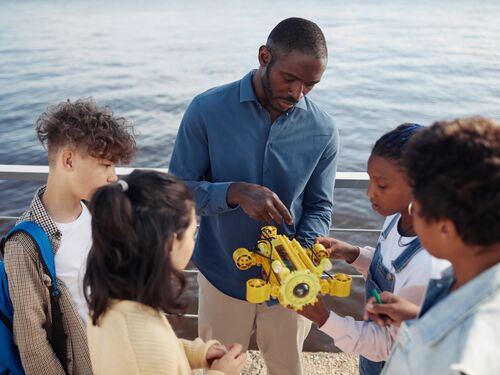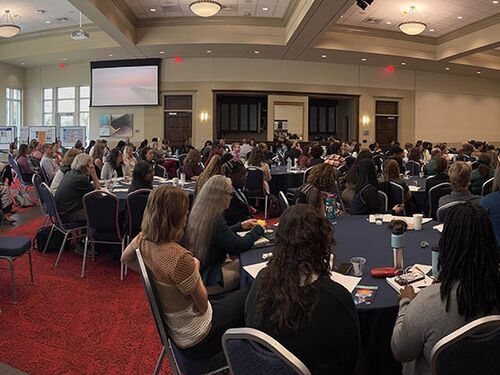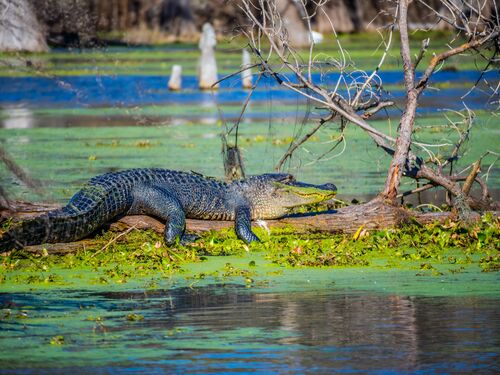Gulf Research Program Awards Over $4.9 Million for Empowering K-8 Youth Through Place-Based Education Projects and Programs
News Release
Last update October 13, 2025
WASHINGTON — The Gulf Research Program (GRP) of the National Academies of Sciences, Engineering, and Medicine announced today an award of more than $4.9 million to fund nine place-based education projects in the Gulf region targeted toward students in grades K-8.
The award aims to support the next generation of informed citizens, scientists, and decision-makers in understanding the challenges of their local communities by strengthening the scientific and environmental literacy and problem-solving skills of children and youth in the Gulf Coast region. Collectively, these projects foster environmental awareness and a connection to place while developing technical proficiencies such as modeling and design; data tracking and analysis; 3D printing, scanning, and virtual reality applications; and ecological observation, scientific inquiry, and experimentation.
“This suite of projects not only strengthens students’ scientific and environmental literacy but also equips them with the technical skills, creativity, and leadership needed to innovate solutions for their communities,” said Karena Mothershed, director of GRP’s Board on Gulf Education and Engagement. “By grounding learning in the unique environments of the Gulf region, these projects inspire students to see themselves as problem-solvers and stewards of their future.”
The awarded projects are:
Project Title: Guardians of the Glades: Exploring South Florida’s Ecosystem Health from Swamp to Shore
Project Director: Lisa Milenkovic, School Board of Broward County, Florida
Award: $629,236
Project Summary:
This immersive educational program is designed to enhance the scientific and environmental literacy of elementary students in Broward County Public Schools while addressing critical issues facing South Florida’s natural environment, particularly the Everglades and Gulf Coast. For many students in high-need schools in Broward, access to natural spaces is limited. This project fosters a deeper understanding of local ecosystems and environmental challenges through place-based education. The curriculum emphasizes keystone species and species survival, and directly addresses scientific literacy goals, aligns lessons with formal education standards, and provides students with relevant, real-world learning experiences. Students engage in action planning and will showcase their learning at a school-based event during Everglades Day to promote environmental stewardship. Through collaborative efforts, innovative teaching methods, and experiential learning, the Guardians of the Glades project can inspire a new generation of environmental leaders and conservation stewards, ensuring a sustainable future for the South Florida community.
Project Title: SEMILLAS: Sowing Environmental Multilingualism: Integrating Learning, Linguistics, and Action in Science
Project Director: Ayca Fackler, University of Missouri
Award: $427,478
Project Summary:
The University of Missouri, Mississippi State University, and Starkville Oktibbeha School District are partnering to address climate change impacts on water in Mississippi communities with growing multilingual student populations. In this district, 70% of students come from minority and economically disadvantaged backgrounds, many living in areas prone to extreme weather events and water contamination from natural and human-induced disasters, such as hurricanes. An interdisciplinary team of scholars will develop educational units, activities, and seminars to support fourth and fifth grade students in becoming agents of environmental change. Grounded in placemaking, futures thinking, and culturally and linguistically sustaining pedagogies, this project empowers students to examine how climate change affects water in their communities. These firsthand experiences will immerse students in their surroundings, strengthening their connection to the community and deepening their understanding of water issues. To ensure long-term impact, the project will establish a sustainable education program through ongoing teacher learning, fostering environmental stewardship among students and educators.
Project Title: Grounded to Grow: Student-Led Green Infrastructure
Project Director: Hayley White, Pontchartrain Conservancy
Award: $227,300
Project Summary:
This three-year, hands-on, inquiry-driven program engages fifth grade students at a Title I school in researching, designing, and implementing green infrastructure solutions, such as a rain garden or permeable pavement, on their school campus. Centered on place-based learning, the program empowers students to explore environmental challenges in their communities while fostering long-term stewardship. Each school year, students begin by investigating stormwater management issues and green infrastructure solutions through classroom instruction, hands-on activities, and field experiences. Students then conduct research and collect environmental data, applying scientific methods to inform their campus project. They will engage with environmental professionals, present their findings to the school community, and refine their designs through peer and expert feedback. Students will implement and monitor a small-scale green infrastructure project using scientific tools to track its impact on stormwater retention and biodiversity. Additionally, teachers will receive training and resources to sustain green infrastructure education beyond the project’s duration.
Project Title: Youth Envision II: Building Coastal Community Resiliency through Youth Empowerment
Project Director: Diane Maygarden, University of New Orleans
Award: $562,015
Project Summary:
The Youth Envision project connects New Orleans students in grades five through eight with their natural environment through lessons on water management and coastal resilience. Co-designed with community partners, the project blends classroom instruction, outdoor learning, and project-based activities. Students explore how human and natural systems are interconnected through site visits, model building, and data collection aligned with state education standards. With additional funding, the program will expand grade-specific activities: younger students focus on schoolyard-based inquiry and design, while older students tackle community and ecosystem-level challenges. Opportunities for students to implement projects will grow, along with more off-campus learning in nearby wetlands. By envisioning future social and ecological conditions, students build leadership skills and contribute to resilience planning in their communities. Youth Envision refines a successful education model that empowers young people to design solutions, strengthen environmental literacy, and take active roles in shaping a sustainable future for New Orleans.
Project Title: Alabama Gulf Coast Resiliency Project: Sustainability, Full STEAMM Ahead
Project Director: Jessica Sampley, Gulf Shores City Schools
Award: $733,024
Project Summary:
This innovative K-8 initiative integrates place-based education, environmental stewardship, and STEAMM (science, technology, engineering, arts, mathematics, and medicine) learning through hands-on experiences that build scientific literacy, problem-solving skills, and environmental responsibility while addressing real-world challenges in students’ coastal community. Each grade level will participate in place-based projects aligned with academic standards, ensuring continuity and long-term impact. Additionally, the Gulf Coast Sustainability Symposium will bring together students, educators, and industry leaders for workshops, competitions, and research presentations. By involving 2,500+ students, 52 teachers, and key community partners, this project will create a new generation of leaders equipped to solve environmental challenges. Through hands-on learning, industry partnerships, and career exploration, students will develop the skills and confidence needed to drive sustainable solutions and build a more resilient Gulf Coast.
Project Title: Enhancing Water Quality and Human Health Knowledge on our Gulf Coast in South Texas
Project Director: Ioana Pavel, Texas A&M University-Corpus Christi
Award: $670,269
Project Summary:
Texas A&M University-Corpus Christi is partnering with local schools of science and technology to engage 600+ students in grades four to seven in scientific literacy and environmental stewardship. These children reside in coastal areas that are currently under extreme drought and frequently experience extreme weather events and boil-water advisories. The interdisciplinary team will develop hands-on educational activities centered on teaching students and their families to safely collect, test, and purify water for drinking from their own household, schools, community, and local beaches, such as the Padre Island National Seashore, where they will also assist in coastal prairie habitat cleanup and conservation. These place-based activities and a seminar series on coastal resources and pollutants will annually culminate in a visit to water/sewage treatment facilities, a report on 1,500+ water samples to the Texas Commission on Environmental Quality, and the new “Water Fair on the Gulf Coast in South Texas” for children, families, and community representatives. This will demonstrate children’s ability to tackle one of the most pressing socio-environmental challenge of our community: the clean water shortage and its human health impacts.
Project Title: Sustainable Solutions Challenge: Empowering K-8 Youth to Protect the Gulf Coast
Project Director: Rachel Gisewhite, University of Southern Mississippi
Award: $748,927
Project Summary:
The STEM Coastal Camp engages students in third to eighth grades in hands-on learning about climate adaptation, coastal resilience, and environmental sustainability. Through immersive field experiences, students explore challenges such as erosion, habitat loss, and biodiversity decline. Camp activities include marine animal conservation at Ocean Adventures Marine Park, sustainable fisheries exploration during a shrimping excursion, and wetland studies at the Pascagoula River Audubon Center. Students also investigate barrier island dynamics on Ship Island and analyze predator-prey systems, water quality, and coastal vulnerabilities. Design-thinking challenges allow students to prototype erosion barriers, model sustainable coastal communities, and interpret GIS maps. Culminating projects, such as public service announcements and a coastal resilience blueprint, empower students to engage in real-world solutions. By integrating field-based STEM education with hands-on engineering, ecosystem science, and community engagement, the STEM Coastal Camp equips students with the knowledge and skills to become future environmental stewards and decision-makers in the Gulf region.
Project Title: Inquiry to Action: Emerging Civic Scientists Leading Waste and Water Solutions
Project Director: Lisa Gianukos, Children’s Environmental Literacy Foundation Inc.
Award: $229,402
Project Summary:
The Children’s Environmental Literacy Foundation (CELF) is expanding its Civic Science: Inquiry to Action framework to students in grades three to five across the Houston-Galveston region. Building on work with students in grades six to 12, this initiative engages younger children in environmental inquiry through outdoor learning, field trips, and community-based projects to build environmental stewardship and foster a sense of belonging. Teachers receive professional development to integrate place-based sustainability topics into the classroom, such as examining school waste systems and watershed health. Students conduct cleanups, waste audits, and field studies at waterways and composting sites, learning how everyday practices connect to environmental outcomes. CELF will host student data exchanges with other partnering schools in the region, including other schools in Greater Houston as well as schools in Louisiana, to compare findings and establish a wider sense of community. Student projects will pursue actions such as reducing cafeteria food waste through composting and improved school gardens and improving school waste management systems to reduce waste getting into waterways.
Project Title: Gulf Futures 3D
Project Director: Kiara Lovett, St. Petersburg Housing Authority
Award: $740,860
Project Summary:
The Gulf Futures 3D project will establish three cutting-edge 3D technology labs within St. Petersburg Housing Authority communities, providing a transformative way to engage youth in scientific exploration. Equipped with 3D printers, virtual reality goggles, and 3D scanners, participants will use 3D technology to address real-world socio-environmental challenges in the Gulf of Mexico region, preparing them for 21st-century careers and empowering them to innovate sustainable solutions. Guided by community partners — including Tampa Bay Watch, JobCorps, SelfCAD, and St. Petersburg College — youth apply STEM skills to community-driven projects, pinpointing local environmental challenges and designing innovative 3D solutions. Projects take place in local parks, beaches, and waterways, strengthening connections to place while building technical expertise. Participants will analyze environmental data, design sustainable solutions, and visualize complex systems to tackle key Gulf Coast challenges. Gulf Futures 3D will cultivate critical thinking and innovation, empowering youth to contribute to a sustainable Gulf region through 3D solutions.
The National Academies’ Gulf Research Program (GRP) is an independent, science-based program founded in 2013 as part of legal settlements with the companies involved in the 2010 Deepwater Horizon disaster. The GRP’s mission is to develop, translate, and apply science to enhance the safety of offshore energy, the environment, and the well-being of the people of the Gulf region for generations to come. It supports innovative science, guides data design and monitoring, and builds and sustains networks to generate long-term benefits for the Gulf region and the nation.
The National Academies of Sciences, Engineering, and Medicine are private, nonprofit institutions that provide independent, objective analysis and advice to the nation to solve complex problems and inform public policy decisions related to science, engineering, and medicine. The National Academies operate under an 1863 congressional charter to the National Academy of Sciences, signed by President Lincoln.
Contact:
Pete Nelson, Director of Public Engagement and Communications
Gulf Research Program
email PNelson@nas.edu



